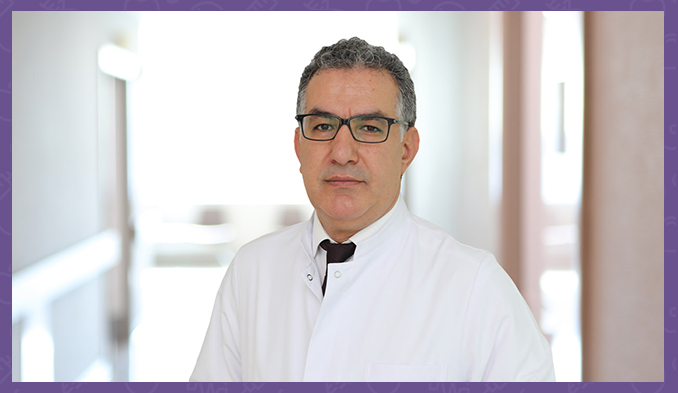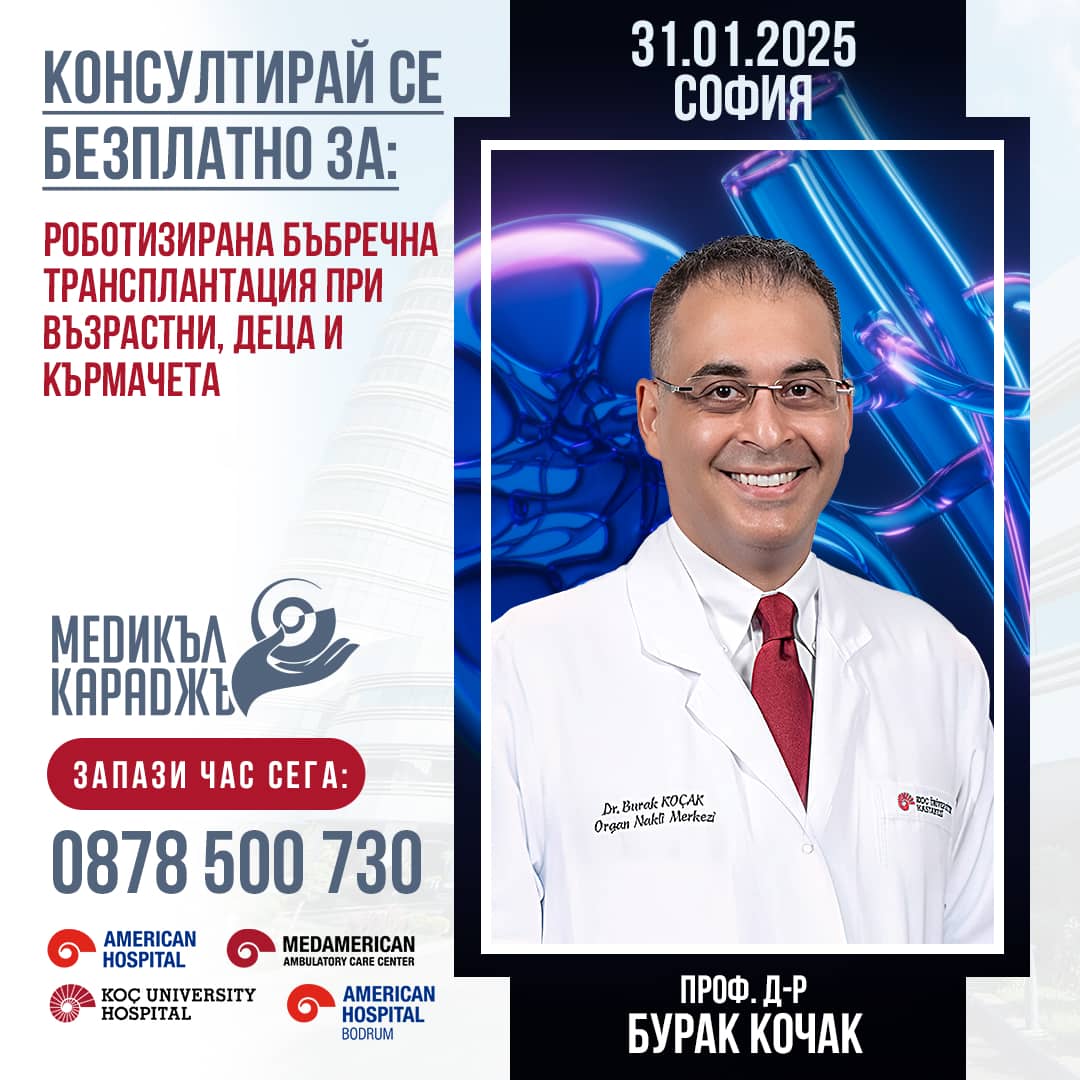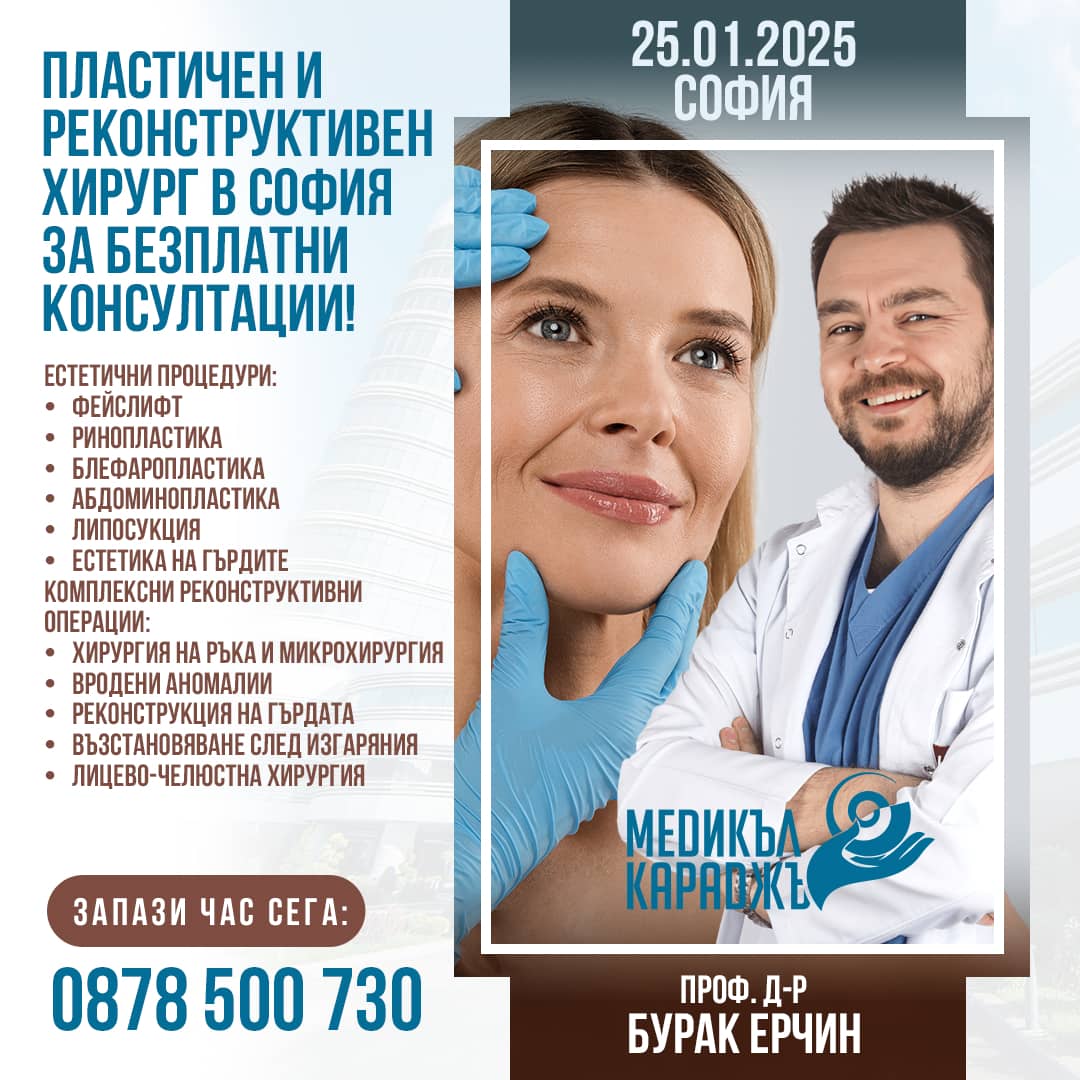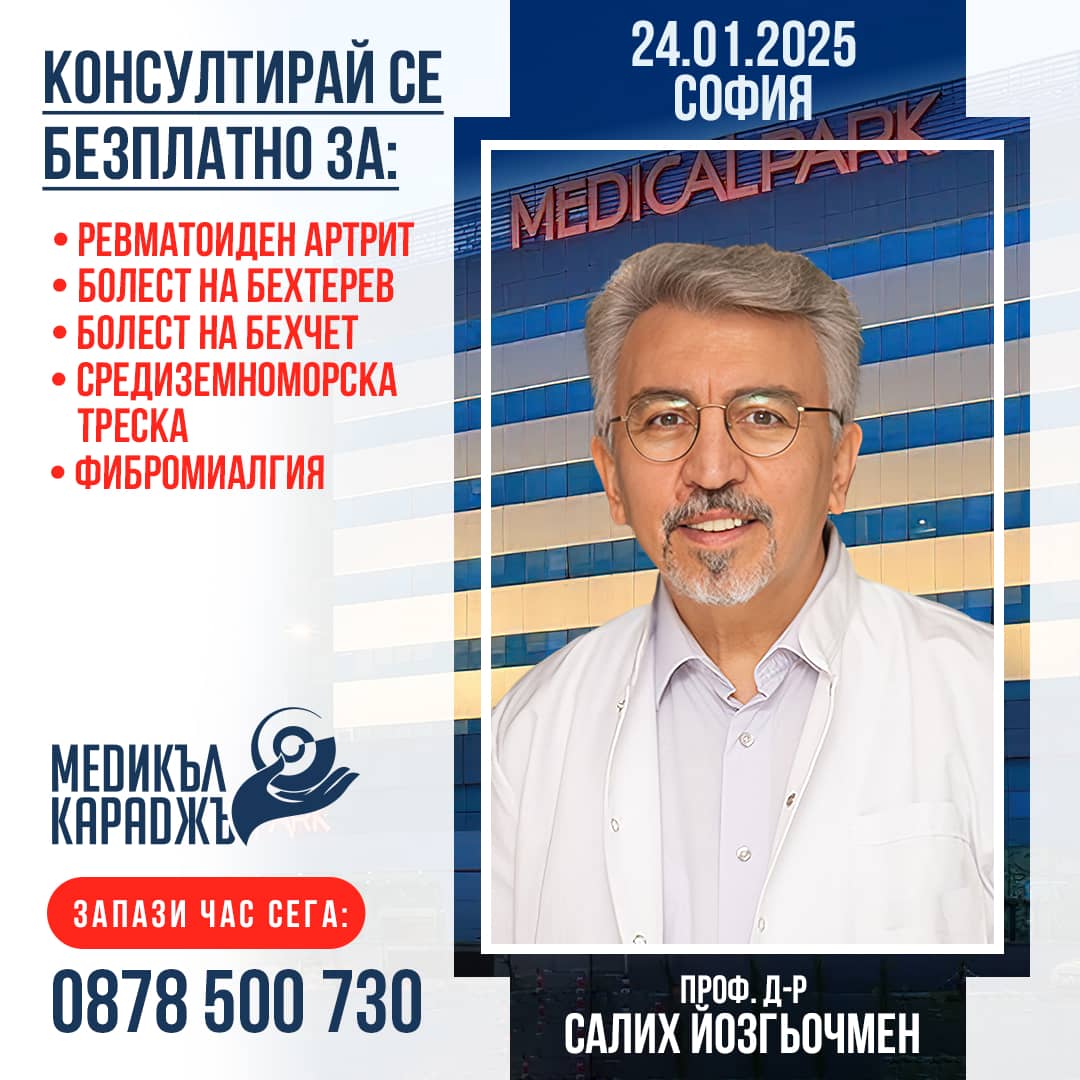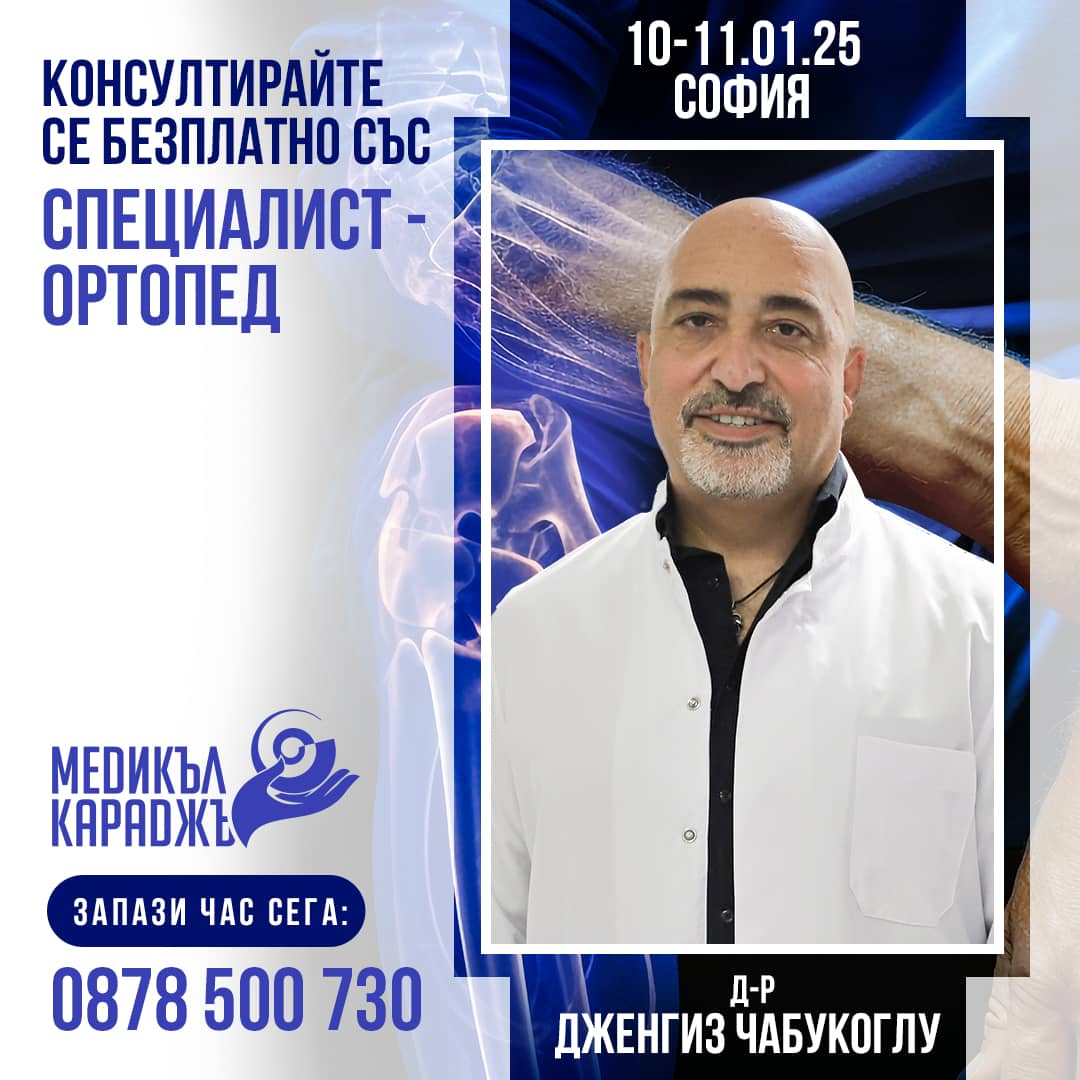The surgeon Prof. Dr. Aziz Sumer is among the leading specialists in diabetic surgery in the world and will be our guest on 17 May 2019 in Sofia. He is coming to Bulgaria for free consultations at the invitation of the manager of Medical Karadži - Zvezdelina Lutfi. The consultations, which will be conducted by Prof. Dr. Sumer, will take place within the framework of our initiative to provide Bulgarian patients with access to the latest methods and technologies in medicine. Prof. Dr. Aziz Sumer practices general surgery, but specializes in metabolic and bariatric surgery, and the treatment of Type 2 Diabetes. Consultations with Prof. Dr. Sumer are suitable for patients needing a second opinion on their diagnosis or patients interested in treatment abroad and in Turkey.
Who is Prof. Dr. Aziz Sumer?
Prof. Dr. Aziz Sumer is a world-class surgeon practicing at the Turkish Medical Park Hospital, Istanbul. He completed his M.D. in 1997 at the Akdeniz University Faculty of Medicine. In 2012, he completed his associate professorship in general surgery at Yuzunku Yul University Faculty of Medicine. In 2017, he became a professor of general surgery at the same university.
His professional experience began in 1997 in the emergency department of the Afyon Dinar State Hospital. The period from 1999 to 2001 he was in charge of hemodialysis at the Istanbul dialysis center REN-MED. Until 2005, he worked at Istanbul Haydarpasa Numune, a research and teaching hospital. In 2005, he continued his practice at the Medical University of Vienna, Austria and AKH Hospital in the Department of General Surgery and Endocrine Surgery Clinic. In the following years, Prof. Dr. Sumer worked and specialized in several public hospitals in Istanbul. His practice and development in new medical and surgical developments passed through hospitals in Seville - Spain, Strasbourg - France and Rome - Italy. He is one of the surgeons working with the innovative da-Vinci® surgical system.
His interests and practice are developed in the following medical directions:
- General Surgery
- Obesity and metabolic diseases
- Diabetic surgery
- Laparoscopic and robotic oncological surgery
- Laparoscopic colorectal surgery
- Endocrine surgery
- Laparoscopic and robotic hernia repair
- Adrenal surgery
- Liver surgery
- Gallbladder surgery
- Surgery of the pancreas
- Surgery for diseases of the spleen
- Kidney transplant
As a proven world-class surgeon, Prof. Dr. Aziz Sumer has numerous articles published in international journals, 12 papers presented at international scientific meetings and published in proceedings, 5 books published nationally and abroad, articles and reports published in national journals, etc.
Morbid Obesity (Bariatric Surgery)
Obesity is a serious disease that contributes to shortened life expectancy and leads to serious chronic diseases.
Obesity can cause: insulin resistance, type 2 diabetes, fatty liver, hypertension, stroke, etc.
The risk of developing: breast cancer, uterine cancer, colon cancer, rectal cancer and prostate cancer are also increased.
Obesity by restricting lung function causes asthma and sleep apnea. Reflux disease, as well as joint and bone diseases, are more common in obese people.
Obesity, given its cancer-inducing characteristics and resistance to cancer treatment, is as dangerous as cancer itself.
To determine the % of obesity, the most common method is body mass index (BMI).
The method of bariatric surgery is associated with drastic weight loss, leading to a cure for type 2 diabetes.
Metabolic Surgery (Type 2 Diabetes)
Diabetes is divided into two types:
- Type 1 diabeteswhich is found in the young. It is caused by damage to the beta cells located in the pancreas and producing insulin. Due to insulin insufficiency, patients must be treated throughout their lives with insulin hormone (by injection). For this reason, type 1 diabetes is called insulin-dependent diabetes mellitus (IDDM). 5 - 10% of diabetic patients have type 1 diabetes. There is no way to surgically treat this type of diabetes. Patients with type 1 diabetes should be treated under the supervision of an endocrinology specialist.
- Type 2 diabetes, covers 90% of all patients with diabetes. Beta cells in the pancreas of patients with type 2 diabetes produce insulin, but it does not affect target tissue because of its severe insulin resistance characteristics. The main cause of type 2 diabetes is obesity. According to TURDEP studies, the prevalence of type 2 diabetes in our country is 7.2%, with an identified pre-diabetic impaired glucose tolerance of 6.7%. Furthermore, while type 2 diabetes has been known to be a disease of adults, recent studies have shown an increase in type 2 diabetes associated with obesity among children. Obesity is one of the most important environmental factors in the development of type 2 diabetes.
Metabolic surgery is suitable for patients aged 18 to 70 years, treated for type 2 diabetes but unable to achieve good blood glucose control, or patients with insulin resistance and poor quality of life.
Surgical treatment performed in patients with type 2 diabetes disrupts insulin resistance and the existing insulin level increases. Meanwhile, an insulin-like hormone called incretin is secreted as an additional effect of surgery performed in the stomach and intestine. Through this surgery, patients are cured of diabetes and reach a normal blood sugar level.
Surgical methods:
Obesity and diabetic surgery is generally referred to as BARIATRIC SURGERY. The word "bariatric" comes from the Greek word "baros," meaning "burden," and has been used since the beginning to describe operations performed on the stomach and digestive system. Metabolic surgery for obesity is known to reduce weight, as well as cure diabetes, hypertension, fat disorders and reduce mortality associated with these diseases.
Operations for obesity and diabetes were first performed in the 1950s. Bariatric surgery developed dozens of surgical techniques. Some have become standard procedures and are still practiced, others have been completely forgotten. Today, there are about 10 methods of surgery for obesity and diabetes.
The methods applied by Dr. Aziz Sumer are:
- Restrictive methods: Among these techniques, sleeve gastrectomy, which reduces the volume of the stomach, and the gastric band method, called lap-band, are the most commonly used. Another technique is an endoscopically placed gastric balloon.
- Restrictive and malabsorptive method: Among these, gastric bypass and SAGB, called mini-gastric bypass, are most commonly applied. These techniques are based on reducing stomach volume and food absorption.
- Malabsorption method: BPD techniques, SADI, etc. In this case, the level of food ingestion is reduced. The volume of the stomach as well as the absorption of nutrients decrease.
FEATURES AND TREATMENT
Complications after surgical operations of morbid obesity are classified as early and late or major and minor. In the early postoperative period, the most common problems are lung related - limited lung function after surgery as a side effect of anaesthesia. For this reason, proper preparation for surgery and breathing exercises are very important in the pre-operative period.
Penetration or bleeding in the postoperative stage of bariatric surgeries are frequently encountered as complications. The rate of these complications in obesity and diabetes clinics with an educated, experienced team is 0.17%. In clinics with no experience it reaches 7%. Complications such as leakage or bleeding are treated endoscopically. Bariatric clinics should be experienced in bariatric surgery and equipped with endoscopic devices to treat complications.
You can read more about Medical Park Hospital here: https://www.medikara.bg/kplus_page/medical-park-hospitals-group
All patients with diabetic and metabolic diseases who wish to take advantage of the opportunity for free consultations with Prof. Dr. Aziz Sumer in Sofia on 17 May 2019, should make an appointment in advance by calling the Health Information Centre at Medical Karadži: 0879 977 401 or 0879 977 402.
During the free consultations, patients must present all the medical documents they have on their case so far. Only in this way can the consultation be as useful as possible for them.

